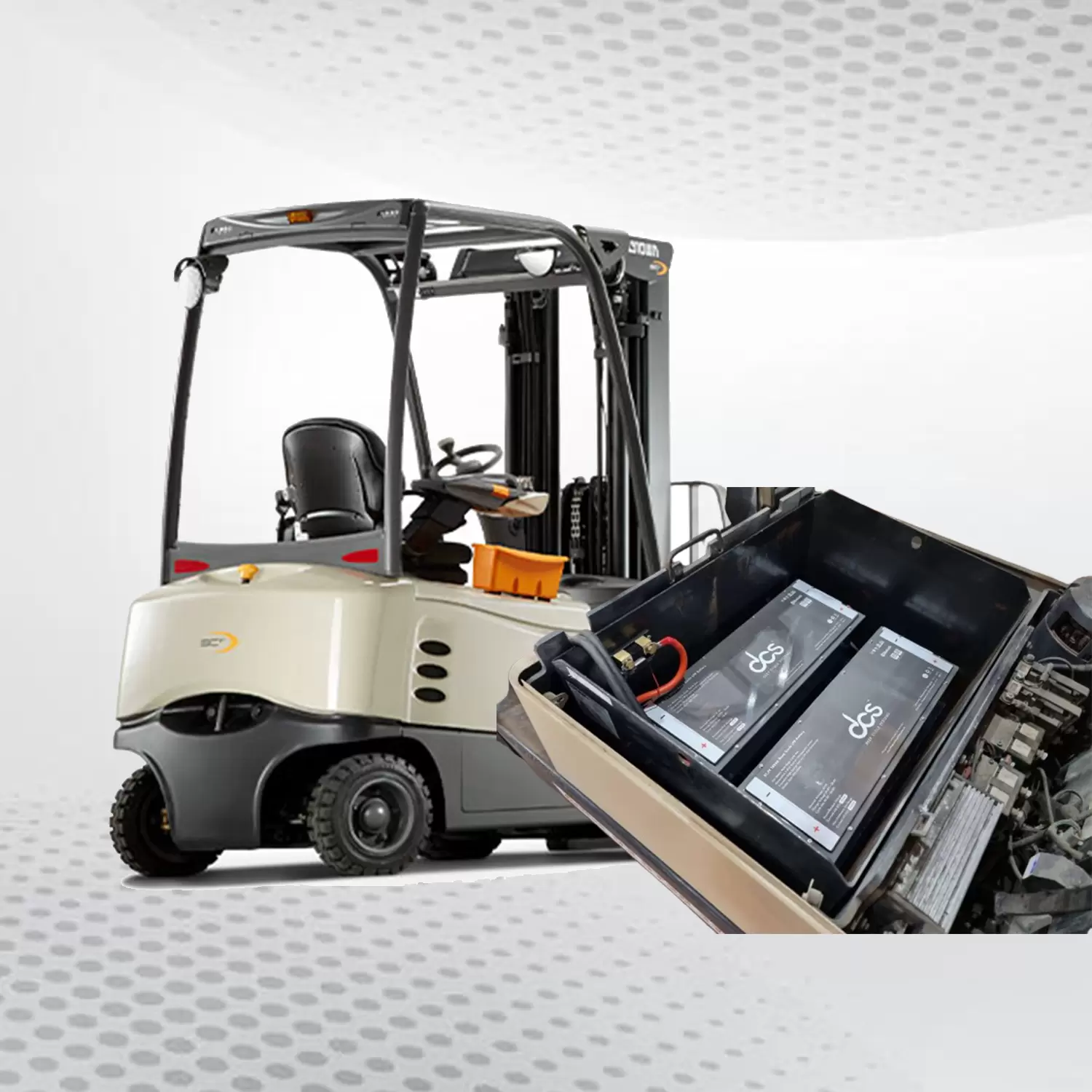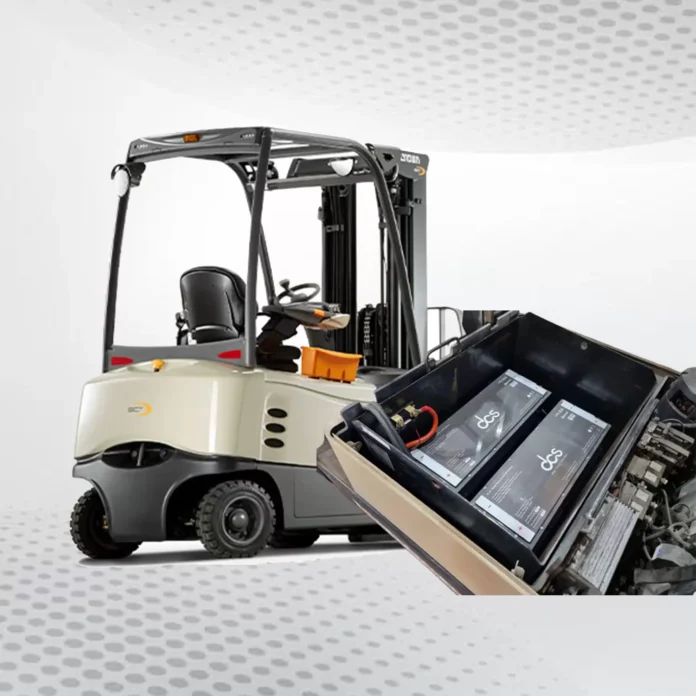When it comes to powering forklifts, the choice of battery plays a crucial role in determining efficiency, cost-effectiveness, and environmental impact. One of the most advanced options available today is the lithium forklift battery. This blog post will delve into the various aspects of lithium-ion forklift batteries, from their technology to their advantages, costs, maintenance, and safety considerations.
Why Choose a Lithium-Ion Battery for Your Forklift?
Opting for a lithium-ion battery to power your forklift has numerous benefits that can transform how your business operates. These batteries stand out for their remarkable energy efficiency, enabling forklifts to operate at a consistent power level for extended periods. This consistent power not only improves the performance of the forklifts but also eliminates the slowdown experienced with traditional batteries as they deplete. Furthermore, the quick recharge capability of lithium-ion batteries minimizes downtime significantly. Unlike lead-acid batteries that require long charging periods a lithium-ion batteries can be charged during short breaks, ensuring that forklifts are ready to go when needed.
The absence of maintenance routines such as water top-ups, which are necessary for lead-acid batteries, reduces the total cost of ownership and frees up personnel to focus on more productive tasks. The environmental benefits of lithium-ion batteries also cannot be overstated. With no emissions and a greener footprint, they allow companies to advance their sustainability goals. Choosing a lithium-ion battery for your forklift is a forward-thinking decision that brings operational efficiency, cost savings, and environmental responsibility to the forefront of your business operations.
 Exploring the Basics of Lithium Battery Forklift Technology
Exploring the Basics of Lithium Battery Forklift Technology
The technology behind lithium battery forklifts centres on using lithium-ion cells, which have a high energy density. This characteristic allows the cells to store significant energy in a relatively small package, making them ideal for powering electric forklifts requiring compact yet powerful energy sources. The core advantage of this technology is the efficiency with which these batteries deliver energy to the forklift’s motor, translating into longer operational times between charges compared to traditional battery types. Integral to the function of these batteries is a sophisticated battery management system (BMS).
This system is pivotal in regulating the battery’s performance, ensuring it operates within safe parameters. It closely monitors critical metrics such as the cell’s voltage, current flow, and temperature. By doing so, the BMS plays a vital role in preventing overcharging and overheating, thus safeguarding the battery’s integrity and extending its service life. Additionally, the modular nature of lithium-ion batteries offers flexibility in terms of configuration, allowing for customization to meet specific power needs or to fit particular forklift models. This adaptability, combined with the inherent energy efficiency of lithium-ion technology, marks a significant step forward in the evolution of forklift power solutions.
Enhancing Workplace Efficiency with Lithium-Ion Batteries
Lithium-ion batteries significantly contribute to optimizing operational workflows within the warehouse setting. Their rapid charging capability ensures that forklifts have minimal downtime, making continuous operation crucial in fast-paced environments. This is particularly advantageous during peak operational hours with high demand for forklift usage. Moreover, the ability of lithium-ion batteries to maintain a consistent output level throughout their charge cycle ensures that forklifts perform reliably without experiencing power drops.
Such reliability translates into predictable and efficient handling times, contributing to a smoother flow of goods and materials. Additionally, the lightweight nature of lithium-ion batteries compared to traditional counterparts allows for better handling and maneuverability of forklifts, further enhancing workplace efficiency. With these benefits, businesses can expect to see a notable improvement in operational speed and reduced bottlenecks, fostering a more productive and streamlined warehouse environment.
Cost Implications of Upgrading to a Lithium Battery for Forklift
The initial expense of adopting lithium battery for forklift operations may appear daunting when compared to traditional lead-acid batteries. However, businesses must consider the broader financial landscape over the battery’s lifetime. Lithium-ion batteries boast a significantly longer lifespan, offering years of service beyond their lead-acid counterparts. This longevity translates into fewer replacements and, consequently, less expenditure over time.
Another critical financial consideration is the operational efficiency of lithium-ion batteries. The rapid recharge capability and the ability to sustain consistent power levels allow forklifts to spend more time in operation and less time idle, waiting for a charge. This increased productivity can lead to a faster return on investment as businesses can move goods more efficiently and capitalize on labour hours more effectively.
Moreover, lithium-ion batteries’ reduced maintenance requirements present another avenue for cost savings. Without the need for regular water top-ups or equalization charges required by lead-acid batteries, businesses can save on labour costs and purchase maintenance supplies. When these factors are collectively considered, the switch to lithium-ion technology emerges as a financially sound decision for businesses looking to maximize the efficiency and longevity of their forklift fleet.
The Environmental Advantages of Lithium-Ion Battery Forklifts
Lithium-ion batteries are heralded for their performance and positive impact on the environment, particularly within the context of forklift operations. The environmental benefits of transitioning to lithium-ion battery forklifts are considerable:
Reduced Greenhouse Gas Emissions
Lithium-ion batteries contribute to lower emissions by being more energy-efficient than traditional power sources. This efficiency translates into fewer greenhouse gases being released into the atmosphere while the forklifts are used and charged.
Decreased Hazardous Waste
Unlike lead-acid batteries, lithium-ion batteries do not contain heavy metals that can lead to hazardous waste issues. This reduces the environmental burden and costs associated with the disposal and recycling of toxic materials.
Energy Conservation
The high energy density of lithium-ion batteries means they require less energy to charge and can operate for more extended periods. This energy conservation reduces the overall electricity consumption, which is often generated from non-renewable sources.
Longer Lifespan
With a longer operational life than conventional batteries, lithium-ion batteries need to be replaced less frequently, resulting in fewer resources for production, transportation, and recycling processes associated with battery lifecycle management.
Recyclability
At the end of their life cycle, lithium-ion batteries can be recycled, recovering valuable materials and further reducing the environmental impact compared to disposing of spent traditional batteries. This recycling process supports the circular economy and reduces the need for raw materials.
These factors collectively position lithium-ion battery forklifts as a sustainable choice for businesses aiming to minimize their environmental footprint while maintaining high operational efficiency.
The Importance of Proper Maintenance for Battery Forklift Lithium
Maintaining your lithium-ion battery for your forklift is critical to ensuring optimal performance and longevity. While these batteries boast a low-maintenance design, attention is required to keep them running efficiently. It’s essential to regularly inspect the battery for any signs of damage or wear, such as cracks or leaks, which could impact its function or safety.
It is also critical to ensure that the battery is kept at an appropriate charge level; neither overcharging nor allowing it to deplete fully is advisable. Implementing a routine schedule for charging, based on the manufacturer’s recommendations, can help maintain the battery’s health over time. Monitoring the battery’s temperature is also essential, as extreme temperatures can affect its performance and lifespan. These simple steps can prevent potential issues and help your battery forklift lithium maintain high performance and reliability.
Safety Considerations for Lithium-Ion Battery Forklifts
Ensuring the safe use of lithium-ion battery-powered forklifts is crucial for maintaining a hazard-free workplace. Unlike traditional batteries, lithium-ion options come with unique safety requirements that, if not followed, could lead to operational risks. It is essential to adhere to the manufacturer’s guidelines on charging and handling to prevent potential incidents. Overcharging a lithium-ion battery can cause it to become unstable, increasing the risk of overheating or, in rare cases, leading to thermal runaway—a condition where the battery could catch fire or explode.
Equally, undercharging or allowing the battery to frequently discharge fully can diminish its capacity and lifespan, potentially leading to unexpected downtimes and operational inefficiencies. It’s also essential to store lithium-ion batteries in a designated area free from flammable materials and equipped with appropriate fire suppression systems. Training staff on the proper use, handling, and emergency procedures related to lithium-ion batteries will enhance workplace safety. Regular inspections should be conducted to identify potential issues, such as damage to the battery casing, connectors, or battery management system. Addressing these concerns promptly can prevent accidents and ensure the safe operation of lithium-ion battery forklifts in the workplace.
How does a 48 Volt Lithium Ion Forklift Battery Transform Operations?
The advent of 48 volt lithium ion forklift battery is revolutionizing warehouse and industrial operations, increasing productivity and efficiency. These high-voltage batteries deliver enhanced power output that supports the operation of heavier machinery and more demanding tasks without compromising energy efficiency. This higher voltage level allows for quicker acceleration and the ability to handle prolonged periods of intensive use, making them particularly suited for more giant warehouses and industrial environments where downtime can significantly impact operations.
One of the standout features of 48-volt lithium-ion batteries is their superior energy density. This quality enables them to provide sustained power over more extended periods, thereby reducing the frequency of recharge cycles needed during shifts. The result is a smoother, uninterrupted workflow that can significantly boost operational throughput.
These batteries support faster charging times, meaning that forklifts can be quickly re-energized during short breaks, effectively minimizing idle time. This capability is critical in maintaining continuous operations, especially during peak periods of activity. Integrating a 48-volt lithium-ion battery into forklift fleets represents a strategic investment in operational excellence, enabling businesses to achieve higher productivity levels and meet their operational demands more effectively.
Conclusion
The shift towards adopting lithium-ion technology for forklift operations is not just a trend but a strategic move towards enhancing operational efficiency, sustainability, and safety in the workplace. These batteries represent a significant advancement over traditional energy sources. They offer benefits that resonate through every layer of business operation—from reducing downtime with their rapid charging capabilities to minimizing maintenance costs and contributing to a healthier planet through greener practices. Despite the initial higher outlay, the investment in lithium forklift battery pays dividends in the long run, reflecting in prolonged battery life, consistent power delivery, and a notable reduction in operational expenses.
FAQs
Q: Are lithium-ion forklift batteries compatible with all forklift models?
A: Lithium-ion batteries offer broad compatibility, so verifying it’s with the specific manufacturer of the forklift model is essential. Sure, forklifts may require specialized adaptations or configurations to ensure optimal performance and safety with a lithium-ion battery system.
Q: What is the expected lifespan of lithium-ion forklift batteries, and how does it compare to traditional batteries?
A: Lithium-ion batteries generally have a longer lifespan, often lasting 5-7 years, depending on the frequency and nature of use. This is significantly longer than the lifespan of traditional lead-acid batteries, making them a more cost-effective solution over time. Proper charging habits and maintenance can extend this lifespan even further.
Q: Can lithium battery forklift be charged during short breaks without damaging them?
A: One of the significant advantages of lithium battery forklift is its ability to be fast-charged without incurring damage or significantly reducing their lifespan. This capability allows flexible charging schedules, including opportunity charging during breaks, which can help maintain continuous forklift operation.
| Other Good Articles to Read |
| Blogs Rain |
| Cme Blog Spot |
| Garcias Blogs |
| Yyc Blogs |
| Guiade Blogs |
| Blogs-Hunt |
| Impact-Blog |
| Smarty Blogs |
| Ed Blog |
| Mo Blogs |
| Blogs Em |
| Blogs T |
| Related Business Listings |
| Contact Directory |
| Local Business Profiles |

